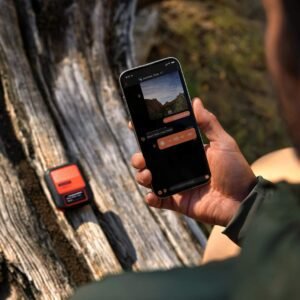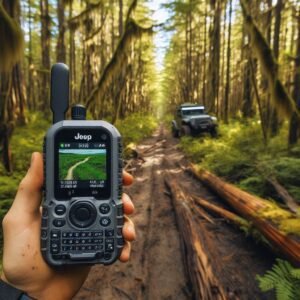Table of Contents
🛰️ Satellite Phones: A Comprehensive Buyer’s Guide
Why Satellite Phones Matter
In an era where connectivity seems ubiquitous, there are still vast stretches of our planet where traditional cellular networks fall silent.
Enter the world of 2025 satellite phones – your lifeline to civilization when you’re far from the beaten path.
Are you planning an adventure to remote or rugged locations? A satellite phone can be an essential tool for staying connected and safe.
Whether you’re an avid hiker, a remote worker, or an emergency responder, this OTL satellite phone buyer’s guide guide will help you choose the best sat phone for your own needs.
Real-Life Lifelines: Satellite Phones in Action
Satellite phones aren’t just fancy gadgets – they’re vital tools that have saved lives and enabled extraordinary feats. Let’s explore some real-world scenarios where satellite communication makes all the difference:
🏔️ Mountaineering Miracles
When a team of climbers found themselves stranded on K2, the world’s second-highest peak, their satellite phone became their lifeline.
They were able to coordinate a daring rescue operation, guiding helicopters to their precise location amidst treacherous conditions.
🌊 Maritime Marvels
For solo sailor Lisa Blair, circumnavigating Antarctica was a test of endurance. Her satellite phone allowed her to stay in touch with weather routers and family, crucial for both safety and morale during her 184-day journey.
🌋 Disaster Response Heroes
In the aftermath of the 2010 Haiti earthquake, traditional communication networks were devastated. Aid workers relied heavily on satellite phones to coordinate relief efforts, locate survivors, and manage the distribution of vital supplies.
🏜️ Desert Dispatches
During the grueling Marathon des Sables, a multi-day ultramarathon through the Sahara Desert, organizers use satellite phones to track runners and respond swiftly to medical emergencies in one of Earth’s most inhospitable environments.
🧗♀️ Remote Research Revelations
Scientists studying climate change in the Arctic depend on satellite communication to send data, receive instructions, and ensure their safety in isolated and often dangerous conditions.
Your Questions, Answered
This latest guide addresses the questions that arise from these real-world scenarios:
- Which device offers the best global coverage for mountaineers?
- How do battery life and durability factor into maritime use?
- What features are crucial for disaster response teams?
- Which satellite networks provide the most reliable service in polar regions?

Key Factors in Choosing Your Sat Phone Lifeline
Selecting the right satellite handset is crucial. Here’s what to keep in mind:
- 📡 Coverage Area: Does it work where you’ll be?
- 🔋 Battery Life: How long will it keep you connected?
- 💪 Durability: Can it withstand your adventure?
- 🎒 Size and Weight: Easy to carry?
- 🛠️ Additional Features: GPS? Weather forecasts? SOS?
- 💰 Cost: Device price and service fees
Best Satellite Phones and Related Devices in 2025
Iridium Extreme 9575: The Rugged Globetrotter
Key Features:
– Global coverage (even at the poles!)
– Military-grade durability
– Integrated SOS button and GPS
– 4 hours talk time, 30 hours standby
Pros: Excellent call quality, truly global coverage, highly durable
Cons: Expensive, larger than some alternatives
Inmarsat IsatPhone 2: Reliability Meets Affordability
Key Features:
– Near-global coverage
– 8 hours talk time, 160 hours standby
– Dust, splash, and shock resistant
– GPS location services
Pros: Long battery life, clear voice quality, relatively affordable
Cons: No coverage at extreme latitudes, bulkier design
Thuraya X5-Touch: Where Satellite Meets Smartphone
Key Features:
– Android-based satellite smartphone
– Dual-mode (satellite and GSM)
– 5.2″ full HD touchscreen
– IP67 water and dust resistant
Pros: Familiar interface, Android apps, seamless network switching
Cons: Limited coverage area, high power consumption
Garmin inReach Mini 2: Compact Adventure Companion
Key Features:
– Two-way text messaging
– SOS alerts to 24/7 rescue center
– Weather forecasts
– 14 days battery life (10-min tracking mode)
Pros: Extremely lightweight, long battery life, affordable messaging
Cons: No voice calls, small screen
Garmin inReach Messenger Plus: The Ultimate Communicator
Key Features:
– Two-way text messaging via satellite
– Voice recording and photo sharing
– Group messaging through Garmin Messenger™ app
– Interactive SOS with 24/7 Garmin Response℠
– Automatic network switching (Wi-Fi, cellular, satellite)
– Up to 25 days battery life (10-min tracking mode)
– Pairs with compatible Garmin devices
Pros: Versatile communication options, long battery life, advanced features
Cons: Requires smartphone for full functionality, potential regulatory restrictions

Satellite Networks: The Invisible Lifelines
Understanding the networks behind these devices:
1. Iridium: Global coverage with 66 low-Earth orbit satellites
2. Inmarsat: Near-global coverage using geostationary satellites
3. Globalstar: Covers most populated areas, some coverage gaps
4. Thuraya: Regional focus on Europe, Africa, Asia, and Australia
Each network has unique strengths in coverage, call quality, and data speeds.
Pricing and Plans: Budgeting for Peace of Mind
Satellite phone costs include:
1. Device Cost: $200 (basic communicators) to $1000+ (advanced satphones)
2. Service Plans: From $15/month (basic messaging) to $100+/month (unlimited voice/data)
3. Pay-As-You-Go: Prepaid options for occasional users
Consider your usage patterns and budget when choosing a plan.
Satellite Phone Buyer’s Guide FAQ
Q: Do I really need a satellite phone?
A: If you venture beyond cellular coverage or need reliable emergency communication, absolutely!
Q: Can I use a satellite phone indoors?
A: Most require a clear sky view. They may struggle indoors or in heavily forested areas.
Q: Are satellite phones legal everywhere?
A: Not always. Some countries restrict or prohibit their use. Always check local regulations.
Q: How’s the call quality compared to cell phones?
A: There may be slight delays and lower audio quality, but it’s continually improving.
Q: Can I use my regular phone number?
A: Typically not, but some providers offer call forwarding options.
Q: Can I send photos with these devices?
A: Advanced models like the Garmin inReach Messenger Plus allow photo sharing when paired with a smartphone.
Q: How does the battery life compare between devices?
A: It varies widely. The Garmin inReach series boasts impressive battery life (up to 28 days), while traditional satphones may last only a few days.

Choosing Your Perfect Satellite Communication Companion
Your ideal satellite communication device depends on your specific needs, budget, and intended use.
Whether you choose the rugged Iridium Extreme 9575, the reliable Inmarsat IsatPhone 2, the smartphone-like Thuraya X5-Touch, or one of Garmin’s versatile inReach devices, you’re investing in peace of mind.
Consider your priorities:
– Need voice calls? Look at traditional satphones.
– Prioritize messaging and compact size? Consider Garmin’s inReach series.
– Want smartphone-like features? The Thuraya X5-Touch might be your match.
– Need the latest tech with photo sharing? The Garmin inReach Messenger Plus has you covered.
Remember to factor in coverage areas, battery life, durability, and additional features.
With the right device and plan, you’ll stay connected on your greatest adventures or during unexpected challenges.
Stay safe, stay connected, and explore with confidence! 🌍🛰️📱

Introducing JC – The Outdoor Gear Enthusiast and Tester behind Outdoor Tech Lab:
Dive into the exciting world of outdoor gear technology with JC, the founder and driving force behind Outdoor Tech Lab.
With a passion for backpacking, nature and a knack for outdoor gadgets, JC has embarked on a mission to help others explore the outdoors in smarter, safer, and more enjoyable ways.
Join us on the adventure as we explore the ever-evolving landscape of outdoor gear & technology.
Through insightful reviews, practical tips, testing and engaging stories, Outdoor Tech Lab is your one-stop shop for navigating the wild world of outdoor gadgets and gear in 2025 and beyond.




Leave a Reply